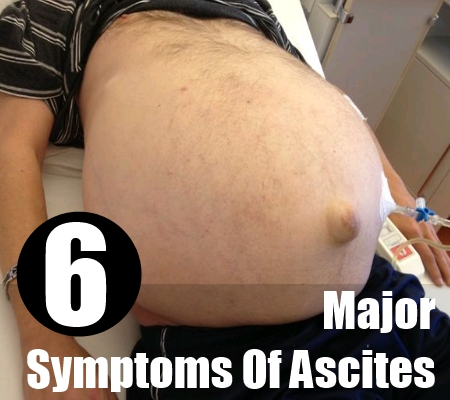Ascites is a medical condition when there is excessive accumulation of fluid in the abdominal lining (peritoneum) of a person’s body. This fluid primarily accumulates when cancer spreads to the abdominal lining from its original site, usually cancers of breast, stomach, ovaries, colon or pancreas.
When small amounts of fluid are present in the abdomen, it may not produce any symptom; however, with the increase in amount of the fluid, major signs and symptoms of ascites become visible.
Various Symptoms Of Ascites
Abdominal Swelling Or Bloating
When cancers, as mentioned above, spread up to the abdominal lining, the abdominal cavity fills up with the ascites fluid, resulting in bloating. In this case, the waist size increases, abdomen swells and there is a visible distention. This distention of abdomen can be very uncomfortable as well as painful. It hampers movement and may not allow you to sit or walk comfortably. More the increase in girth, more is the accumulation of ascites fluid inside the body.
Shortness Of Breath
As already mentioned above, ascites causes abdominal bloating or swelling. When large amount of ascites fluid accumulates in the tummy, it exerts pressure on the diaphragm. Since the diaphragm is under pressure, it hampers its movement and shortness of breath is experienced.
This may also lead to lethargy in a person and the person may not be able to do much of physical exercise due to feeling or tiredness that strikes much earlier than the normal capacity of the person.
Abdominal Pain
If ascites is severe, it can be very painful. Abdominal pain occurs as a symptom of ascites, due to infection or malignancy in the peritonea. Due to fluid accumulation and pressure exerted by it, ascites can lead to portal hypertension. In this, the portal venous system is under pressure, not letting flow of blood by veins to go smooth. This results in sensation of constant pain in the abdomen, which is definitely uncomfortable.
Nausea And Vomiting
Ascites fluid accumulation presses on to the stomach and bowels. It does not let the bowels to pass through the gastrointestinal tract smoothly. Also, pressure on stomach and intestines often leads to indigestion or partial digestion. This indigestion leads to the urge to vomit or nausea. Nausea and vomiting also give a constant feeling of sickness and can be very uncomfortable at times.
Feeling Of Fullness And Decreased Appetite
Ascites, as mentioned, causes abdominal swelling plus pressure on stomach and diaphragm. As the fluids fill the abdominal cavity, the person having ascites experiences a feeling of fullness, even if he or she consumes a small volume of food. This naturally leads to loss in appetite. The affected person may not feel hungry at all and ever if he experiences any hunger, he may be satiated by a meager amount.
Pleural Effusion
When ascites is severe, fluid may migrate or move around the lungs, leading to pleural effusions. It occurs when fluid occupies the space between the linings of the lungs. It may impair the ability of lungs to move and expand as we breathe in. Often it is accompanied by chest pain and difficulty in breathing.
Ascites is a worrisome and painful condition which should be followed up by frequent abdominal examinations. However, one should also consider the potential risks that are related with the underlying causes of ascites, like liver or kidney disease or various cancers.
Caution: Please use Home Remedies after Proper Research and Guidance. You accept that you are following any advice at your own risk and will properly research or consult healthcare professional.







